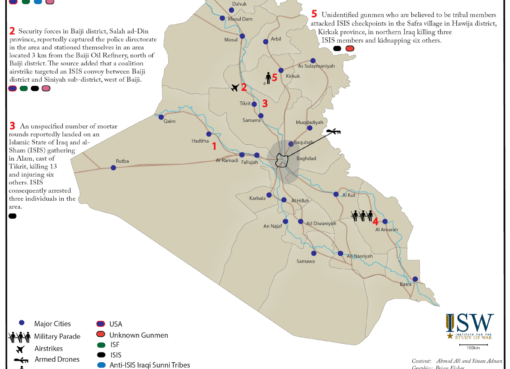| Little by little, oil exports via Turkey from Iraq’s semiautonomous northern region of Kurdistan are rising, transforming the parameters of the eight-year oil dispute between the federal authorities and the Kurdistan Regional Government (KRG) in Erbil. Baghdad’s legal case against the KRG continues to deter almost all buyers of Kurdish pipeline crude, but thanks to clandestine trans-shipment trade via Israel, cargoes are finding a home, mainly in Asia. The volumes are not insignificant — from just 40,000 barrels per day a year ago, KRG oil exports are now running at 300,000-350,000 b/d. And with Erbil targeting 400,000 b/d by year-end, these flows will not dry up any time soon. The KRG started trucked exports to Turkey’s Gulf of Iskanderun ports in late 2012 — Toros handles Khor Mor condensate, Mersin light sweet Taq Taq crude, and Dortyol a mixture of Taq Taq and sour Shaikan crude. The real jump in export levels came in late May, with the start of shipments along the Iraq-Turkey Pipeline (ITP) to Ceyhan. This was done in defiance of the federal government, which promptly filed a lawsuit with the Paris-based International Chamber of Commerce (PIW Jun.2’14). The intergovernmental ITP agreement contains a clause giving Baghdad a veto over third party usage.
Pipeline exports have surged over the past couple of months and are now around 240,000 b/d, according to estimates from Turkish energy minister Taner Yildiz which are supported by shipping data. Controversially, this latest increase has been enabled not by further development of KRG fields, but by the pumping of crude from the Bai Hassan and Avana Dome fields, formerly operated by federal state North Oil Co. (NOC), but seized by KRG forces in July, thus freeing up more Kurdish crude for export (PIW Oct.6’14). Following a fast-tracked refit of the Sarulu sulfur-stripping facility at Avana by Kurdish firm Kar, around 100,000 b/d is now being pumped to Kar’s Khurmala field, a Kurdish source says. Trucked exports to Turkey, meanwhile, are put at just under 100,000 b/d by trading sources, while anecdotal evidence also indicates that trucking via Iran may be on the rise, perhaps to over 50,000 b/d.
The sales system developed by the KRG seems robust and the market has clearly developed an appetite for its oil. But Erbil is as yet deriving little immediate financial benefit from its crude marketing successes, and remains vulnerable to economic and political pressure. Ankara has baulked at releasing full payment for pipeline crude to Erbil, apparently due to concerns over possible legal consequences, while export volumes are at any rate still too small to compensate for Baghdad’s non-payment of the KRG’s 17% share of the national budget. KRG crude has had to be discounted, while the complex marketing system involving ship-to-ship transfers and offloading and storage in Israel has been costly. The United Leadership, the tanker that lifted the first-ever KRG pipeline cargo, stayed offshore Morocco for four months before carrying out a ship-to-ship transfer off Malta two weeks ago, while a court battle is ongoing in Texas to decide if the United Kalavryta, anchored off Galveston since late July, can offload. For trucked volumes, Switzerland-based trader Petraco is mainly handling Shaikan crude, while Vitol has a term deal, involving pre-payment, for Taq Taq out of Mersin, sources say. Hungary’s Mol, an upstream operator in the KRG, is the only major refiner to publicly acknowledge buying a KRG pipeline cargo, and is in talks on a full on sales agreement, sources say. Concern over potential legal consequences has deterred Turkey from buying any Kurdish crude, but refiner Tupras has emerged as the dominant buyer of producer equity Basrah Light, since federal pumping on ITP to Ceyhan was cut in early March (PIW Sep.22’14).
The KRG’s oil aspirations have always been viewed with hostility by Iraqi Arabs, but the Israel connection — some 11 out of the first 19 Kurdish cargoes out of Ceyhan have offloaded at Ashkelon, sources say — and the takeover of NOC’s Kirkuk assets are seen by Arabs as genuine treachery at a time of national crisis. This leaves an oil agreement between Baghdad and Erbil as far away as ever, despite the pressing need for such a deal to help secure the broader alliance between the federal government and the KRG that is vital to success in the conflict with Islamic State. With both Washington and Iran opposing Kurdish oil unilateralism and relations with Ankara souring since August, there is intense pressure on the KRG to compromise. But the evidence of the past eight years is that any oil deal is unlikely to be permanent, and could well be outlived by the basic crude marketing arrangements already put in place by Erbil.
*Up to Oct 17. Source: Shipping and trading sources |
||||||||||||||||||||||||||||||||||||||||||
Source: Petroleum Intelligence Weekly, October 27, 2014








Comment here